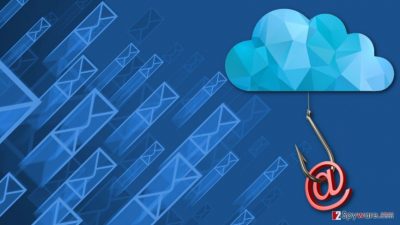Fake FBI email asks to transfer 112$ to verify iCloud account
Crooks and scammers love to use the name of FBI to commit cyber crimes. During the past few years, various versions of FBI virus and other scams[1] have tricked many people. This time cyber criminals struck again and aimed at Apple users. Victims receive a fake email from Federal Bureau of Investigation that informs about unauthorized activity on the iCloud account and asks to verify the account by sending 112$ to the provided Bitcoin wallet address. Indeed, receive the email from the FBI might look terrifying and serious. However, you should always be skeptical and critical. Think twice whether the issue presented in the email is not absurd. Shouldn’t you receive an email from iCloud security center about detected unauthorized sing-in? Why would FBI be interested in this issue and demand Bitcoins? What is more, it’s also a good idea to check typos, grammar and spelling mistakes which will definitely reveal that someone tries to scam you.

Recently, cyber criminals launch a scam campaign and sent thousands of emails having a misleading subject line “Virus Warning: E-Mail from FBI Alert.” Of course, the title catches the eye and motivates to read the email instantly. The message informs that Apple detected unauthorized login to the iCloud. For this reason, a user has to verify his or her account by sending 112$ dollars within 2 hours.What is more, if a person does not transfer the money in time, his or her account will be locked. Doesn’t it sound like blackmail?[2] Indeed, similar examples we have seen in the ransom notes[3] created by the ransomware developers.
Often when talking about phishing and email scams[4], security specialists remind to take a close look at the sender’s email address. Usually, these emails do not resemble the organization or company. But not this time. FBI scam emails are sent from SERVICE@FBI.gov; therefore, the address does not raise any distrust. However, other tips always suggest reading the message attentively and looking for typos, grammar or spelling mistakes. This time cyber criminals have left plenty of them[5]:
Virus Warning: E-mail from ‘FBI Alert’
Apple has detected an unauthorized sign-in to your iClodu [sic] account.
Please verify your account by sending 112$ to this Bitcoin address:
If no response is received your account will be locked for security.
The server will lock yor [sic] account within 2 hours if we don’t receive the payment!
We are working to create a world where privacy is the norm, end-to-end encryption is the standard, and security and usability are synonymous.
FBI and iCloud is selling a tool for iCloud protection against hackers and scammers this tool costs only 112$
the license for our tool is 360 days
if you are not familiar with bitcoin you can buy it from here:
coinbase(dot)com
bitstamp(dot)net
localbitcoin(dot)com
After we confirm the payment, we send the private key so you can unlock your email and download our tool
FBI SECURIRY [sic] iCloud and Apple Protection
From the email above, you can see that cyber criminals even failed to write iCloud’s name properly. Therefore, when you receive an email asking to pay some money, you should not rush looking for your credit card in the pocket. Even if the email is sent from FBI, the president of the United States or other important people, always read the email few times and look for mistakes, lack of credentials and other visual differences from the official emails. Cyber criminals also offer to purchase a special FBI’s and iCloud’s protection from hackers and scammers. If you would look for the information about this tool on Google, you will find out that it’s non-existent. Double-checking information always helps to save your money and identity. Lastly, we want to remind that you should check all issues and look for necessary help from official iCloud security center.
- ^ Garrett Brnger, David Ibanez . FBI warns of scam calls from FBI number. Ksat. The latest in news, weather and sports for San Antonio and Central and South Texas.
- ^ How to Deal with Online Blackmail. ReputationDefender. Online Reputation Management.
- ^ Ransom Notes: Know What Ransomware Hit You. Trend Micro Blogs. Simply Security News, Views and Opinions from Trend Micro offers breaking security research and threat news that impacts your life everyday.
- ^ Warning: Fraudulent Emails. IATA. The International Air Transport Association (IATA) supports aviation with global standards for airline safety, security, efficiency and sustainability.
- ^ Christopher Boyd. Fake FBI mail: “Send us $112 or we’ll lock your iCloud account”. Malwarebytes Labs. Official Malwarebytes Security Blog.

